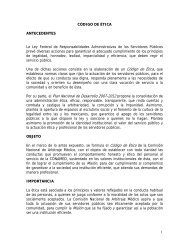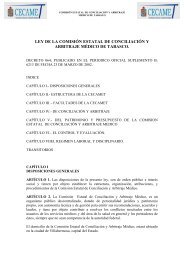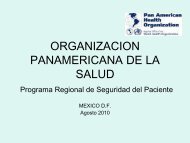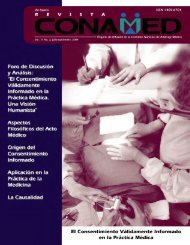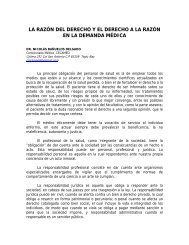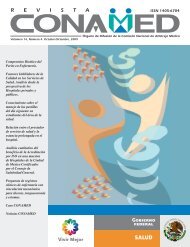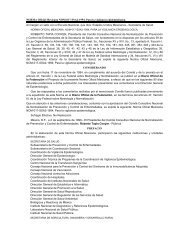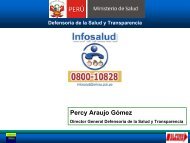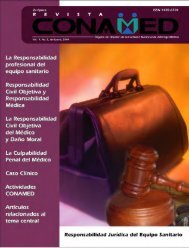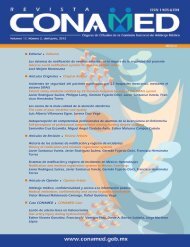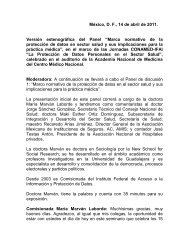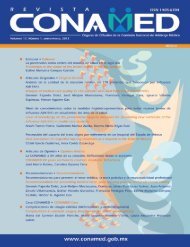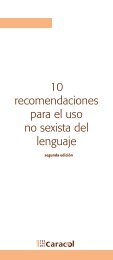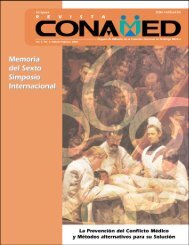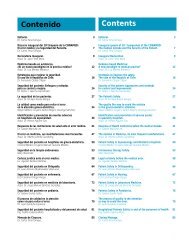www.conamed.gob.mx
www.conamed.gob.mx
www.conamed.gob.mx
Create successful ePaper yourself
Turn your PDF publications into a flip-book with our unique Google optimized e-Paper software.
R E V I S T A<br />
Rev CONAMED 2010; 15 supl.1: 23-29.<br />
Índice de conocimiento sobre alimentación en primigestas<br />
de 25 a 30 años en la primera consulta prenatal<br />
para la mejora de su autocuidado<br />
Knowledge index on nutrition in 25 to 30 years old primigravida<br />
women during the first prenatal<br />
consultation, to improve their self-care<br />
RESUMEN<br />
Reyna Fabiola Chávez-Ochoa 1 , José Angel Luna-Rojas 2 , Veronica Aviles-Ortiz 3 , Natividad Cabrera-Sánchez 4<br />
Introducción. Las embarazadas representan un grupo<br />
prioritario para la atención en salud, al cual se le debe<br />
garantizar condiciones óptimas de salud. La mala alimentación<br />
puede ocasionar alteraciones como obesidad o desnutrición,<br />
y genera complicaciones al binomio madre-hijo,<br />
como: defectos en el tubo neural, retardo del crecimiento<br />
intrauterino, retraso mental en prematuros y recién nacidos;<br />
en la mujer causa abortos, partos prematuros y enfermedad<br />
vascular placentaria.<br />
Material y métodos. Estudio cuantitativo, transversal<br />
y descriptivo en una muestra por cuota de 35 primigestas<br />
de bajo riesgo. En la primera consulta prenatal se consideraron<br />
las características sociodemográficas y el conocimiento<br />
alimenticio durante el periodo gestacional. Se utilizó una<br />
escala tipo Likert con 4 categorías y una segunda sección<br />
confirmatoria del conocimiento a través de una tabla de relación<br />
de columnas. Para el análisis estadístico se utilizó el<br />
programa SPSS.<br />
Resultados. El promedio de edad fue 27 años con una<br />
desviación estándar de 2.12, el nivel de escolaridad se ubicó<br />
en secundaria (f=14), el ingreso mensual se encontró en el<br />
rango de $1,000 a $3,900 (f=33), refirieron ser vegetarianas<br />
(f=2). El 42.9% respondió que probablemente si tiene conocimiento<br />
sobre alimentación; sin embargo en la tabla comprobatoria<br />
el 62.8% reportó que probablemente no conoce<br />
sobre vitaminas y minerales, lo que orienta a pensar que dicho<br />
desconocimiento es favorecedor de las complicaciones<br />
en el binomio madre-hijo de salud antes anotadas.<br />
Conclusiones. La muestra presenta desconocimiento<br />
de las necesidades de aporte adecuado de vitaminas, minerales<br />
y las enfermedades que previene el consumo de estos<br />
nutrientes durante la etapa gestacional.<br />
Palabras Clave: Primigestas, alimentación, embarazo.<br />
ABSTRACT<br />
Artículo Original<br />
Introduction. Pregnant women represent a highpriority<br />
group which requires the best conditions of<br />
health. Bad alimentation provides alterations such as: Undernourishment,<br />
obesity and leads to complications to the<br />
mother-son binomial (Defects in the neural tube, retardment<br />
of intrauterine growth, mental retardation in prematures<br />
and newborns; to women it may cause abortions,<br />
premature parturitions and vascular illness).<br />
Material and methods. Quantitative study, cross<br />
sectional and descriptive in a count of 35 low-risk primigravidas.<br />
A measure instrument was applied at first prenatal<br />
consults which considered sociodemographical characteristics<br />
and nutritional knowledge during the gestational<br />
period in a 1st section via Likert Scale with 5 categories<br />
and a 2nd section proving the knowledge using a chart<br />
confirming the relation of columns. SPSS Program helped<br />
the descriptive analysis and the trustworthiness of the<br />
data.<br />
Results. The age average was 27 years old with a<br />
standard deviation of 2.12, the scholarly level was located<br />
at secondary (f=14), the monthly income was located in a<br />
range from 1000 to 1900 (f=13), referred themselves as<br />
not being vegetarian (f=33).<br />
The 42.9% said that it may probably have knowledge<br />
of its nutrition; whatsoever in a provisory table 67% reported<br />
that does not know about vitamins and minerals.<br />
This proves that such lack of knowledge leads to health<br />
deviations before checked.<br />
Conclusions. This sample shows lack of knowledge<br />
from the “adequate” usage of vitamins, minerals and diseases<br />
that their consume would prevent during gestational<br />
period.<br />
Key words: Knowledge, alimentation, pregnancy.<br />
1. Jefe se servicio Hospital General “Dr. Enrique Cabrera Cosio, 2. Profesor de asignatura, Escuela Superior de Enfermería y<br />
Obstetricia, IPN: 3. Enfermera. Especialista, Hospital de Especialidades PEMEX Picacho, 4. Jefe de Servicio Hospital General de<br />
Naucalpan “Dr. Maximiliano Ruíz Castañeda.<br />
Artículos recibidos 28 de julio 2010; Primera revisión 26 agosto de 2010; Aceptado 30 de septiembre de 2010.<br />
Correspondencia: Reyna Fabiola Chávez - Ochoa. 4ta Cerrada de Retoño Núm. 33 Int. 5. Col. El Retoño C.P 09440. Delegación<br />
Iztapalapa, D.F. Correo electrónico: thewoman079@hotmail.com.<br />
Revista CONAMED, Suplemento de Enfermería 2010<br />
ISSN 1405-6704<br />
S23



